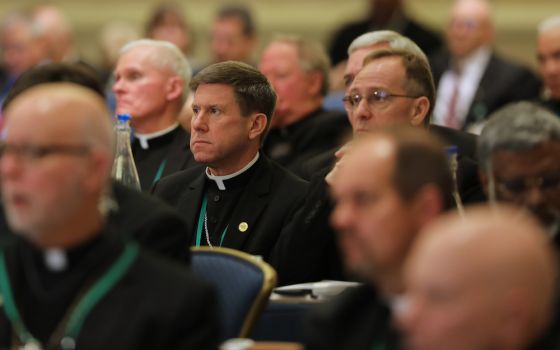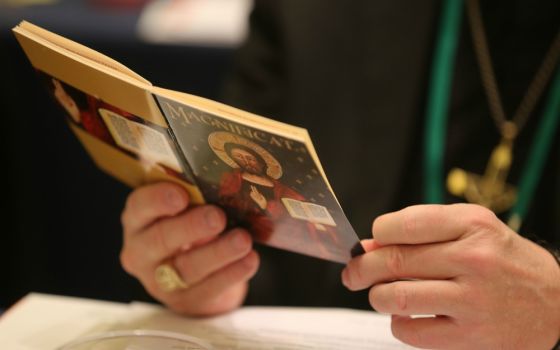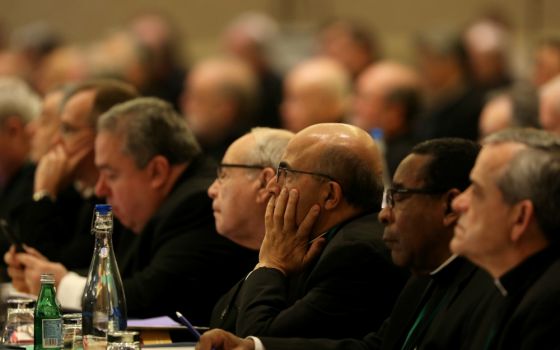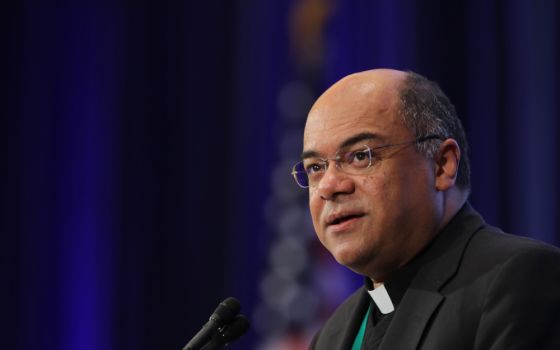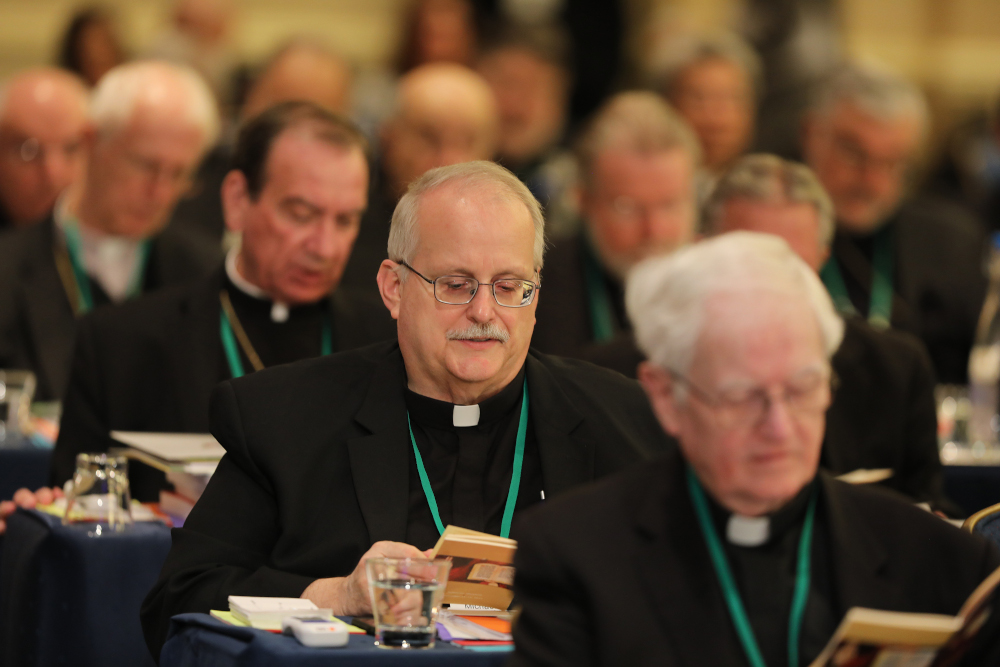
Bishops attend morning prayer during the fall general assembly of the U.S. Conference of Catholic Bishops in Baltimore Nov. 11. (CNS/Bob Roller)
As the United States Conference of Catholic Bishops opened its plenary this morning, and always they begin with morning prayer, the bishops had scarcely finished the Benedictus when Bishop Joseph Strickland of Tyler, Texas, approached one of the microphones to urge the bishops to focus on the defense of the deposit of faith.
Looking around the room, I did not see any posters that read "Down with the Nicene Creed" nor witness any bishops whispering against the hypostatic union. What was he talking about? The poor man has bought into the nonsense emanating from LifeSiteNews and EWTN, from Cardinal Raymond Burke and Kazakhstan Auxiliary Bishop Athanasius Schneider, the idea that Pope Francis is indifferent or even hostile to orthodoxy. It is bunk, of course, but bunk with a currency in certain well-funded conservative sectors of the church in the United States.
The apostolic nuncio, Archbishop Christophe Pierre, opted not to deliver an adversarial speech, offering a speech that was more encouragement than reproach. He is aware of the fact that when his predecessor, Archbishop Carlo Maria Viganò, issued his screed attacking the pope and calling for him to resign, dozens of U.S. bishops issued statements attesting to Vigano's integrity while saying nothing about the Holy Father's integrity.
So, it was not surprising, but it is still shocking, that Pierre felt the need to tell the bishops: "[I]t may be useful to prayerfully reflect on the gift of communion with the Bishop of Rome. While we reflect on this communion in a theological way, we ought to examine it practically, namely by measuring to what extent we as individuals and our local churches have received the Magisterium of Pope Francis."
As far as I can tell, the conference has done nothing to help receive the pope's apostolic exhortation Amoris Laetitia and zilch implementing the vision of his encyclical "Laudato Si', On Care for Our Common Home."
The most important point of interest for NCR readers was debate over the bishops' quadrennial document on voting, "Forming Consciences for Faithful Citizenship," which commenced this morning. Last year, the bishops decided to retain the underlying text and to merely devise scripts for five videos and a new introductory statement. A staff member told me that the texts had been closely guarded and shown to few of the conference's own staff. Unlike in previous years, we in the media got no advance copies.
Before the debate, the bishops received copies of amendments the working group had accepted. Chicago Cardinal Blase Cupich proposed an amendment to the text, urging the bishops to include Paragraph 101 of Gaudete et Exsultate in its entirety, replacing a paraphrase the drafting committee has supplied. He noted as the reason for the amendment, "The pope is expressing concern about those who bring an ideological mindset to issues. ... The draft wording citing this paragraph omits 'equally sacred' from the start of that list of important concerns, defacing the point the pope was making, which is obviously that the defense of the unborn is not 'the only thing that counts.' " Cupich offered another amendment in which he said the proposed language "pivots to giving singular attention to abortion and does so in language that is tendentious and remarkably different from the treatment of other issues in the lines that follow as other issues are raised."
Later, the feisty cardinal noted, "Political solutions aren't geysers. They come about or fail because politicians push for them or block them. We are not dealing simply with an 'absence of comprehensive immigration reform,' but rather a presence of demonizing rhetoric and abusive, violent policy directed at a group of human beings who are denounced as dangerous or worse by top elected officials. I am not suggesting that this document name names, but might American Catholics expect a bit more candor on this subject?"
Advertisement
To be clear, in the exceedingly polite and formalized language that characterizes debates at the bishops' conference, these are fighting words.
Needless to say, the drafting committee turned Cupich's proposals into the rhetorical equivalent of a weak cup of tea. Better a glass of clean, clear water than a cup of weak tea, but the conference has substituted weak tea for leadership. Unable or unwilling to bridge the divisions within their ranks, they reach consensus by offering bromides. They are firm in their commitment to rhetorical mush, steadfast in the defense of compromise, decisive about their indecision, bold in their proclamation of the banal. This is not moderation, a stance that can be defended from a variety of perspectives. This is a vacuum of leadership manifesting itself in mediocrity. And, they wonder why no one listens to them anymore?
There was almost no actual debate on Faithful Citizenship. The vote will take place tomorrow.
[Michael Sean Winters covers the nexus of religion and politics for NCR.]
Editor's note: Don't miss out on Michael Sean Winters' latest. Sign up and we'll let you know when he publishes new Distinctly Catholic columns.




